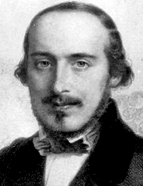

Rebelo da Silva occupied numerous public posts. While still very young, at the age of only 22, and benefitting from being close to the greatest names of Portuguese romanticism (Garrett, Herculano and Castilho), he became part of the Comissão Ortográfica [Orthographic Committee] which was set up to organize publication of a dictionary to be published by the Imprensa Nacional. The purpose of this was to bring some order to the irregularities of Portuguese spelling of the time. A short while afterwards, in 1845, he was nominated to the Secretariat of the Council of State. Being an active supporter of constitutional monarchy, he was elected as a deputy for the first time in 1847 in the lists of the Chartist Party. He was then re-elected, but this time for the Historical Party, for the 1848-1851 mandate and then once again for the chambers that resulted from the 1852, 1857, 1858 and 1860 elections. One of his most notable interventions was during the debate which preceded the passing of the Acto Adicional à Carta Constitucional [Additional Act to the Constitutional Charter] in which he fought an oratorical duel with Almeida Garrett (at the time Minister of Foreign Affairs). Rebelo da Silva argued for the defeated position, which was based on the premise that the Chamber had no powers to reform the provisions of the Constitutional Charter. He became a member of the Chamber of Peers by royal nomination in the year 1862, remaining there until 1871. He also accepted the post of Minister and Secretary of State for the Navy and Overseas Affairs as part of a government team led by the Duke of Loulé.
He was a very active participant in the periodical press and was either editor or a collaborator on titles as diverse as O Cosmorama Literário (1839), Revista Universal Lisbonense (1842-1843), O Panorama, O Diário do Governo (1845-1846), A Carta (1848), Época (1848), A Imprensa (1851), A Imprensa e Lei, A Pátria (1856) and A discussão (1860) among others. Being a commentator who was aware of the key issues of the time, his texts reveal concerns that are both doctrinaire and pedagogic. As Bulhão Pato once said of Rebelo da Silva, if “the sun of his talent broke through very early and very brilliantly” (Sob os Ciprestes, 1986, p. 168), like a flame, he was suddenly extinguished when he reached his maximum blaze. Prematurely taken by death, he died when he was only forty-nine.
